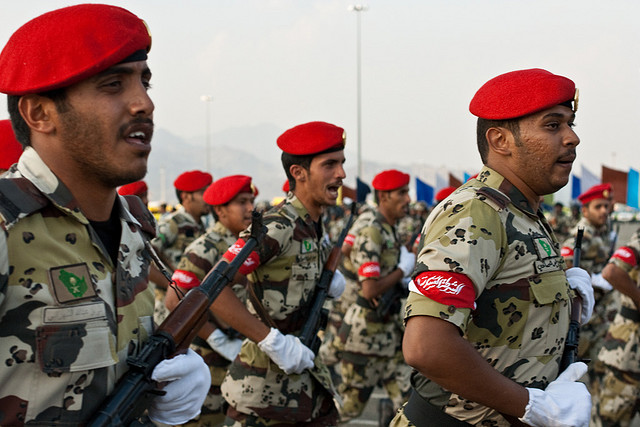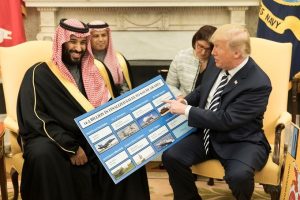by James Spencer
Some hard-bitten fathers have been known to advise their youthful offspring that whenever someone prefaces their remarks with “To be honest,” they are about to lie through their teeth. The same might be applied to politicians who wrap themselves in words like “legitimacy” and “legality.”
Former President Ali Abdullah Saleh—who came to power after his predecessor’s assassination by a bomb attack to which Salih has been linked—was very fond of proclaiming his “constitutional legitimacy.” Protestors in the street, however, made it plain that he had little democratic legitimacy and eventually overthrew him.
In announcing the start of the kinetic operation against the Houthis, Saudi Ambassador Adel al-Jubeir made much of President Abdu Rabu Mansur Hadi’s “legitimacy.” This statement of legitimacy was echoed by the spokesperson of the US National Security Council. Yet Hadi was the only candidate on the ballot that elected him president, and the real purpose of the vote was probably to prevent Saleh from continuing to claim to be the elected president. Although the procedure may be legal, such an “election” was hardly legitimate.
Short-term Western support for such undemocratic practices undermines Western soft power and thus the attractive aspects of the West’s foreign policy. It also makes the emergence of true democracy less likely, thus increasing the probability of terrorism emerging under repression. Many of these terrorists likely blame Western enablers of repression and seek to attack them.
Domestically, Hadi’s legitimacy also seems to have been dwindling. “The already rampant corruption within the government has, if anything, worsened since Hadi came into power,” writes Peter Salisbury in Foreign Policy. “And many in Sanaa are asking whether some of the money lavished upon Yemen has been helping the beleaguered and unpopular president to remain afloat.”
There is also the issue of the current legality of Hadi’s presidency. The election that brought him to power provided him with a mandate to oversee the Gulf Cooperation Council-backed transition for two years from February 2012. That period has now ended. That surely casts doubt on the legality—as well as the legitimacy—of Hadi’s continuation in the presidential office. (This latter issue applies also to Mahmoud Abbas of Palestine, so this is not unique.) The questionable legality and legitimacy of his government raises questions about the legality of any agreement the “incumbent” may sign, including his call for foreign assistance. In addition, post-electoral governments—such as during coalition-building in the event of a hung parliament—do not make or implement policy decisions, but rather operate as caretaker governments.
Saudi Ambassador al-Jubeir invoked “the principle of self-defense, enshrined in Article 51 of the UN Charter” as a justification for kinetic operations. Although there have been myriad unsubstantiated allegations of Iranian assistance to the Houthis, and some assertions by credible sources to that effect, no foreign forces had directly attacked Yemen prior to the aerial attack by the Saudi-led coalition. The legality of the UN Charter-authorized right to self-defense seems legally questionable at least.
Interestingly, the US NSC spokesperson said that “Saudi Arabia, Gulf Cooperation Council (GCC) members, and others will undertake military action to defend Saudi Arabia’s border and to protect Yemen’s legitimate government,” while Ambassador al-Jubeir declared that “the operation will be limited in nature, and designed to protect the people of Yemen and its legitimate government from a takeover by the Houthis.” The US position—of self-defense against a Houthi aggression into the Kingdom of Saudi Arabia—would fulfil the UN Charter self-defense requirements, while Hadi’s presence safe and sound in Riyadh would suggest little need to continue operations in Yemen to protect him.
In a similar vein, according to Reuters, “Pakistan has made no decision on whether to give military support to a Saudi-led coalition intervening in Yemen, Defense Minister Khawaja Asif said on Friday, while pledging to defend .” Article 2 of the UN Charter states, “Nothing contained in the present Charter shall authorize the United Nations to intervene in matters which are essentially within the domestic jurisdiction of any state.”
The UNSC has passed no resolution on the issue, in particular not under Chapter VII (authorizing the use of force). Rather, it issued a Presidential Statement. Although explicitly critical of the Houthis’ actions, the statement also called on “all member States to refrain from external interference which seeks to foment conflict and instability and instead to support the political transition.” Interestingly, the Presidential Statement both referred to Hadi’s presidency as legitimate and endorsed the Houthi-driven “Peace and National Partnership Agreement and its security annex.”
Ambassdor al-Jubeir also cited Hadi’s invocation of the “Arab League charter’s collective defense mechanism.” Yet the countries arrayed against the Houthis are not Arab League forces, nor are they operating under an Arab League mandate. Instead, they appear to be a “coalition of the willing” assembled by Saudi Arabia to implement Saudi regional ambitions (in particular to roll back an expansionist Iran). Whatever the justness of the cause, this intent (as well as the fig leaf of UN legality) is reminiscent of the US-led invasion of Iraq, which was in reality an expression of American exceptionalism to advance US hegemonic interests.
The problem is that such “exceptionalism” appears to be spreading. Not only has Israel long claimed exceptionalism in its conduct but now China is increasingly making the same noises, for instance over most of the South China Sea. Russia too has acted similarly in the Caucasus and with its annexation of Crimea. Now Saudi Arabia is asserting the same right to use force in the situation in Yemen.
Such unilateral kinetic conduct, if unchecked, may herald a return to the use of force as a means of foreign policy and an undoing of the UN system. Imperfect as that system is, it has kept the world freer of conflict than it might otherwise have been these past 70 years. It must be shored up, not allowed to collapse.
James Spencer is a retired infantry commander who specialized in low-intensity conflict. He is an independent strategic analyst on political, security and trade issues of the Middle East and North Africa and a specialist on Yemen.





